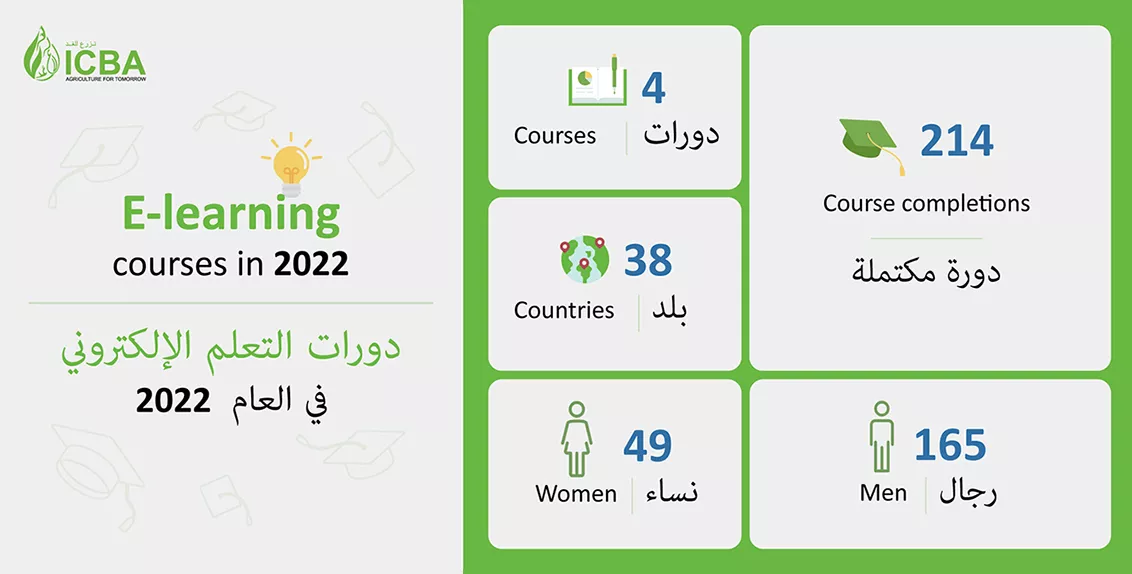ICBA’s e-learning courses benefit learners from 38 countries in 2022
31 December 2022
As climate change continues to place pressure on already fragile agri-food systems, the need for professionals and students alike to have a deep understanding of land management, crop diversification, genetics, and climate change modeling and adaptation is critical. It is in this context that the International Center for Biosaline Agriculture’s (ICBA) suite of e-learning courses has achieved remarkable success.
Aimed at providing courses to professionals, specialists, extension officers, and students in land and water management as well as climate change impact, the platform saw a significant uptake in enrolment throughout 2022. Over 200 course completions were registered by learners from 38 countries, including Australia, Egypt, Kenya, Morocco, Nigeria, Pakistan, Tunisia, and the UAE. Women represented 23% of graduates who received an ICBA e-certificate upon completion. The courses offer comprehensive curricula covering the latest techniques and strategies in land management, biosaline agriculture, the impact of climate change on arid regions and irrigation management.
Dr. Charbel Tarraf, Chief Operations and Development at ICBA, said: “ICBA's e-learning platform is integral to the center's capacity development efforts. It is designed to expand the reach and impact of the center's knowledge transfer. The e-learning platform offers certified training to a wide range of stakeholders interested in sustainable agriculture and related fields. All courses are self-paced and provide great flexibility to learners. We aim to continue developing new courses and diversifying topics to meet our stakeholders' needs.”
The e-learning courses are part of ICBA's commitment to providing accessible, high-quality education to individuals and organizations worldwide. The four courses offered in 2022 include:
- Climate and Biosaline Agriculture
- Climate Change and Impacts on the Arid Regions
- Integrated Land Management in the United Arab Emirates
- Water Resources and Irrigation Management Systems in Arid Regions
One of the key factors behind the success of the e-learning courses is the quality of their content, which has been developed by ICBA’s scientists and experienced consultants who are leading experts in their respective fields. All courses are accredited by the Continuing Professional Development (CPD) Certification Service based in the UK.
Developed in collaboration with the Environment Agency – Abu Dhabi (EAD), each course features presentations, videos, interactive quizzes and reading material, allowing students to attain and cement their knowledge in a practical setting. A satisfaction rate of 80% or higher was recorded by students across all four courses.
Many students reported significant improvements in their knowledge and skills following the completion of a course, along with a deeper understanding of the challenges facing food systems and how to think critically about addressing these issues.
Mr. Olusola Adegboyega Ojo, a participant from Nigeria, said: “This training is an eye opener for me, especially on climate change issues which affect general agricultural value chains and humanity. My capacity has been enhanced and I earnestly look forward to more engaging training, coupled with periodic workshops (physical or virtual).”
Participants also praised the e-learning portal for its high-quality education that is improving capacity development and supporting efforts to solve the climate crisis.
Mr. Itai Lawrence Dzedze, a participant from the UAE, said: “[The] training is very important and addresses urgent practical issues which need to be resolved to save our planet, mankind and all biodiversity.”
The center will continue to build on the successes of 2022, aiming to develop new courses and diversifying topics to meet the needs of stakeholders.











